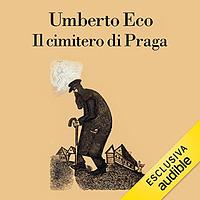You need to sign in or sign up before continuing.
Take a photo of a barcode or cover
adventurous
challenging
dark
mysterious
tense
slow-paced
Plot or Character Driven:
A mix
Strong character development:
No
Loveable characters:
No
Diverse cast of characters:
No
Flaws of characters a main focus:
Yes
dark
informative
mysterious
slow-paced
Plot or Character Driven:
A mix
Strong character development:
No
Loveable characters:
No
Diverse cast of characters:
No
Flaws of characters a main focus:
Yes
Eco's The Prague Cemetery features an anti-protagonist that you love to hate and hate to love. He's all things loathsome, and yet I couldn't help get caught up in his various evil machinations and ruthless ability to destroy others. I nearly lost interest when the novel tells a convoluted story of espionage, double-dealing, and betrayal in Italy, but once we find Simonini in Paris, spinning his anti-Semitic, anti-masonic, and anti-Jesuit plots that revolve around dark doings at a Prague Cemetery, then I couldn't put the novel down. The clever illustrations are wonderful additions.
This interview with The Mountain Goats' John Darnielle inspired me to read the book.
This interview with The Mountain Goats' John Darnielle inspired me to read the book.
dark
mysterious
slow-paced
Plot or Character Driven:
Character
Strong character development:
Complicated
Loveable characters:
No
Diverse cast of characters:
No
Flaws of characters a main focus:
Yes
I think this is a good book in a lot of ways. It is very readable, somewhat perversely, given how numbing I also found it. There's interesting meaning to be found in my reaction to it, which was often to be lost in a dizzy daze of names, places and attitudes I either couldn't or didn't want to keep up with: the alienating nature of investigation makes it appealing to accept the easy lie (dnf), or something. But I'm not sure Eco meant for that. He might have, but he also might have meant for me to carefully pick over this, keep up with it all, learn the history.
I did not do that. I found the book compelling, but never appealing, and I remember very few names, dates, plot points, conspiracies, anything much. Also, and this isn't a point against the book (but might be a point against paying any attention to this review) I picked it up because I'm going to Prague soon and I wanted to read something set in Prague. This book is not set in Prague. I'm also not sure if that's supposed to be obvious, like if the title is supposed to generate recollections of a certain other (inter)text, but the contents of anti-semetic conspiracy theories is not a cultural touchstone for me, so it didn't.
I did not do that. I found the book compelling, but never appealing, and I remember very few names, dates, plot points, conspiracies, anything much. Also, and this isn't a point against the book (but might be a point against paying any attention to this review) I picked it up because I'm going to Prague soon and I wanted to read something set in Prague. This book is not set in Prague. I'm also not sure if that's supposed to be obvious, like if the title is supposed to generate recollections of a certain other (inter)text, but the contents of anti-semetic conspiracy theories is not a cultural touchstone for me, so it didn't.
Só não leva 5 estrelas pq a primeira metade é uma seca descomunal.
Not *quite* on the same level as [b:The Name of the Rose|119073|The Name of the Rose|Umberto Eco|https://i.gr-assets.com/images/S/compressed.photo.goodreads.com/books/1415375471l/119073._SY75_.jpg|3138328] or [b:Foucault's Pendulum|17841|Foucault's Pendulum|Umberto Eco|https://i.gr-assets.com/images/S/compressed.photo.goodreads.com/books/1396645125l/17841._SY75_.jpg|11221066] but still a fantastic work. Hyper-relevant for today's age and politics -- the idea that hate and conspiracy inevitably spiral out of the control of their progenitors is sublime.
As with many of Eco's books, I found myself digging into the real historical events surrounding it as he draws you heavily into the world of the characters. Unlike some of his other books, you don't (fortunately) relate directly to the narrator, who is held at a distance somewhat. This is very much for the best, given the subject matter.
As with many of Eco's books, I found myself digging into the real historical events surrounding it as he draws you heavily into the world of the characters. Unlike some of his other books, you don't (fortunately) relate directly to the narrator, who is held at a distance somewhat. This is very much for the best, given the subject matter.
dark
mysterious
slow-paced
Plot or Character Driven:
Plot
Strong character development:
No
Loveable characters:
No
Diverse cast of characters:
No
Flaws of characters a main focus:
No
Finalmente torno a leggere, dopo un bel po' di anni, il mitico Umberto Eco, del quale avevo apprezzato Il nome della rosa, Baudolino, Il pendolo di Foucault e L'isola del giorno prima.
Nel cimitero di Praga troviamo il capitano Simonini che sarà testimone ed artefice di vari avvenimenti storici del diciannovesimo secolo: dalla carboneria all'Unità d'Italia passando per la spedizione dei Mille, dall'Impero di Napoleone III all'affare Dreyfuss passando per l'esperienza della Comune parigina. Incontrando tutta una serie di personaggi storici realmente esistiti.
Purtroppo, nella mia grande ignoranza storica, non ho apprezzato a pieno questa sua ultima opera, e me ne vergogno. Ma non pensate di leggere un normale libro storico, ma ritorna la caratteristica principe di Eco: ovvero quella di riannodare i fili della storia. E non riesci più a distinguere cosa è inventato e cosa sia realmente accaduto nella realtà, questo mi ricorda ad esempio gli stratagemmi che utilizza in Baudolino.
Non è di facile lettura, questo è sicuro.
Nel cimitero di Praga troviamo il capitano Simonini che sarà testimone ed artefice di vari avvenimenti storici del diciannovesimo secolo: dalla carboneria all'Unità d'Italia passando per la spedizione dei Mille, dall'Impero di Napoleone III all'affare Dreyfuss passando per l'esperienza della Comune parigina. Incontrando tutta una serie di personaggi storici realmente esistiti.
Purtroppo, nella mia grande ignoranza storica, non ho apprezzato a pieno questa sua ultima opera, e me ne vergogno. Ma non pensate di leggere un normale libro storico, ma ritorna la caratteristica principe di Eco: ovvero quella di riannodare i fili della storia. E non riesci più a distinguere cosa è inventato e cosa sia realmente accaduto nella realtà, questo mi ricorda ad esempio gli stratagemmi che utilizza in Baudolino.
Non è di facile lettura, questo è sicuro.
I enjoyed it well enough while reading it, but there wasn't much story there. It's a lot like Baudolino, just with anti-Semitism instead of Prester John.





